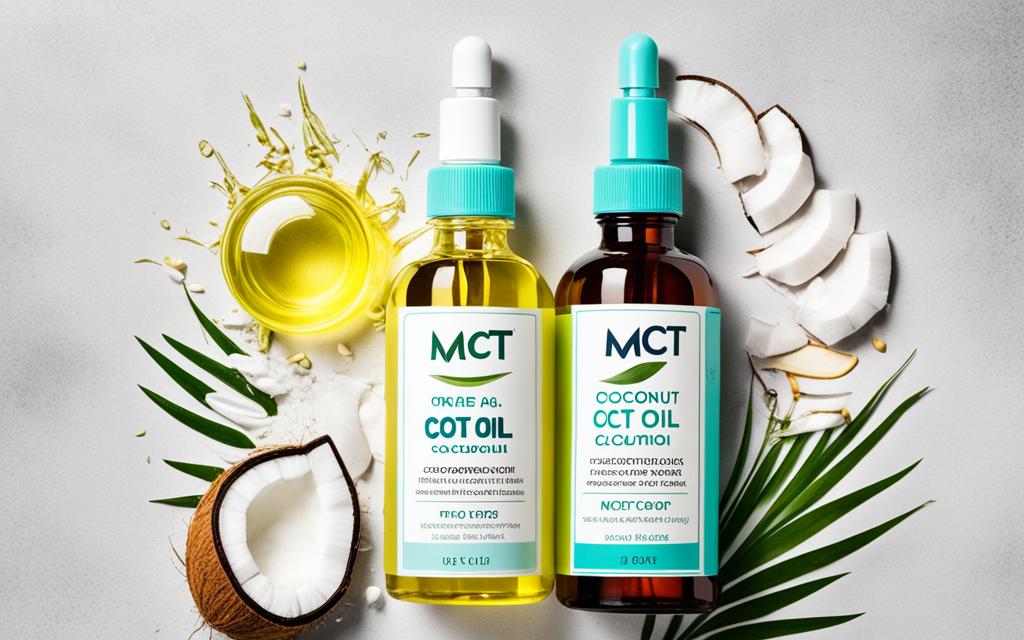In this article, we’ll explore the key differences and benefits between MCT oil and coconut oil, two popular and versatile oils that are gaining attention in the health and wellness community. We’ll dive into their sources, processing methods, nutritional profiles, and the unique ways they can impact your health. By the end, you’ll have a better understanding of which oil might be the better fit for your individual needs and lifestyle.
Introducing MCT Oil and Coconut Oil
MCT oil and coconut oil are both types of saturated fats, but they have some distinct differences. MCT oil is derived from the medium-chain triglycerides (MCTs) found in certain oils, such as coconut oil and palm kernel oil. These MCTs are a type of fatty acid that can be quickly absorbed and utilized by the body for energy.
While MCT oil and coconut oil share some similarities, they differ in their sources and processing methods. Understanding the unique properties of each oil can help you determine which one might be a better fit for your health and wellness goals.
In the following sections, we’ll delve deeper into the differences between MCT oil and coconut oil, exploring their sources, nutritional profiles, and the potential health benefits they offer.
Sources and Processing Methods
MCT oil is typically derived from two primary sources: coconut oil and palm kernel oil. These oils contain the highest concentrations of medium-chain triglycerides (MCTs), the key component that distinguishes MCT oil from other types of oils.
To produce MCT oil, the MCTs are isolated and concentrated through a process called fractionation. This separation technique involves breaking down the various fatty acid components within the oil, allowing the MCTs to be extracted and refined into a concentrated form. This process ensures that MCT oil contains a higher percentage of the desired medium-chain triglycerides compared to the original source oil.
On the other hand, coconut oil is derived directly from the meat or “meat” of the coconut fruit. The oil is extracted through various methods, including cold-pressing, wet-milling, and dry-milling. These processing techniques can affect the final composition and qualities of the coconut oil, impacting factors like aroma, flavor, and nutritional profile.
| Sources of MCT Oil | Sources of Coconut Oil | Processing Methods |
|---|---|---|
| Coconut oil | Coconut meat | Fractionation (for MCT oil) |
| Palm kernel oil | – | Cold-pressing, wet-milling, dry-milling (for coconut oil) |
By understanding the sources and processing methods for both MCT oil and coconut oil, you can make more informed choices about which oil best suits your dietary needs and preferences.
MCT Oil vs Coconut Oil
When comparing MCT oil and coconut oil, there are both similarities and differences to consider. Both oils are types of saturated fats, but the specific fatty acid compositions set them apart.
The primary distinction is that MCT oil is derived from the medium-chain triglycerides (MCTs) found in certain oils, such as coconut oil and palm kernel oil. These MCTs are a unique type of fatty acid that can be quickly absorbed and utilized by the body for energy. In contrast, coconut oil contains a mix of medium-chain and long-chain triglycerides, including the distinctive fatty acid lauric acid.
Another key difference is the processing methods. MCT oil undergoes a process called fractionation to isolate and concentrate the medium-chain triglycerides, while coconut oil is typically extracted through a more natural process, such as cold-pressing or centrifugation.
| Comparison | MCT Oil | Coconut Oil |
|---|---|---|
| Fatty Acid Composition | Higher concentration of medium-chain triglycerides (MCTs) | Mix of medium-chain and long-chain triglycerides, including lauric acid |
| Processing Method | Fractionation to isolate and concentrate MCTs | Cold-pressing or centrifugation to extract the oil |
| Potential Health Benefits | Rapid absorption and utilization for energy, potential benefits for weight management and cognitive function | Potential benefits for immune system, skin health, and heart health |
While MCT oil and coconut oil share some similarities in their origins and saturated fat content, the differences in their fatty acid profiles and processing methods can lead to distinct health effects and applications.
Nutritional Profiles and Composition
When it comes to the nutritional profile of MCT oil and coconut oil, there are some distinct differences to consider. MCT oil is primarily composed of medium-chain triglycerides (MCTs), which are a type of saturated fat that can be quickly absorbed and utilized by the body for energy. In contrast, coconut oil contains a mix of medium-chain and long-chain triglycerides, including the unique fatty acid lauric acid.
| Nutrient | MCT Oil | Coconut Oil |
|---|---|---|
| Macronutrients | MCT oil is nearly 100% medium-chain triglycerides, with minimal amounts of other fats. | Coconut oil is approximately 90% saturated fat, including both medium-chain and long-chain triglycerides. |
| Micronutrients | MCT oil is typically void of vitamins, minerals, and antioxidants, as it is a highly refined and purified product. | Coconut oil contains small amounts of vitamins, minerals, and antioxidants, such as vitamin E and polyphenols, depending on the processing method. |
The nutritional profile of MCT oil and coconut oil can have a significant impact on their potential health benefits and applications. Understanding these macronutrient and micronutrient differences can help you make an informed decision about which oil best fits your individual dietary needs and health goals.
Health Benefits of MCT Oil
MCT oil has been studied for its potential health benefits, which include weight management, enhanced energy levels, and improved brain health.
One of the key benefits of MCT oil is its ability to support weight management. MCTs are metabolized differently than long-chain triglycerides, as they are more readily absorbed and used for energy rather than stored as fat. Studies have shown that incorporating MCT oil into your diet can help increase feelings of fullness and reduce overall caloric intake, potentially leading to weight loss over time.
In addition to its weight management benefits, MCT oil has also been linked to increased energy levels. MCTs are quickly absorbed and transported to the liver, where they can be readily converted into ketones and used as a fuel source for the body. This rapid energy production can help you feel more alert, focused, and energized throughout the day.
Furthermore, MCT oil has been researched for its potential to support brain health. The ketones produced from MCT metabolism can provide an alternative energy source for the brain, potentially enhancing cognitive function, memory, and focus. Some studies have even suggested that MCT oil may be beneficial for individuals with neurological conditions, such as Alzheimer’s disease.
Overall, the health benefits of MCT oil make it a versatile addition to a balanced diet and lifestyle. Whether you’re looking to manage your weight, boost your energy, or support brain function, incorporating MCT oil into your routine could be a valuable step towards optimizing your overall well-being.
Health Benefits of Coconut Oil
Coconut oil has also garnered attention for its potential health benefits, which include supporting your immune system, skin health, and heart health. This versatile oil is rich in medium-chain fatty acids, such as lauric acid, that may provide a range of advantages for your overall well-being.
One of the key benefits of coconut oil is its potential to enhance immune system function. The lauric acid found in coconut oil has antimicrobial properties that may help fight off harmful bacteria, viruses, and fungi, potentially boosting your body’s natural defenses.
Coconut oil has also been studied for its potential to promote skin health. Its moisturizing properties can help keep your skin hydrated and supple, while its antioxidant content may protect against environmental stressors that can damage skin cells. Additionally, coconut oil’s antimicrobial properties may make it beneficial for addressing certain skin conditions.
Furthermore, coconut oil has been linked to potential heart health benefits. While it is a saturated fat, the medium-chain fatty acids in coconut oil may have a different effect on cholesterol levels compared to long-chain saturated fats. Some research suggests that coconut oil may help maintain healthy cholesterol levels and support cardiovascular function.
Incorporating MCT Oil and Coconut Oil into Your Diet
When it comes to incorporating MCT oil and coconut oil into your diet, the options are endless. Both oils offer a variety of culinary and health-boosting applications that can easily be integrated into your daily routine.
To enjoy the benefits of MCT oil, you can start your day with a spoonful added to your morning coffee or smoothie. MCT oil mixes well and can provide a quick energy boost to kickstart your day. You can also use it for cooking tips such as sautéing vegetables, drizzling over salads, or even baking with it in place of other oils.
Coconut oil, on the other hand, is a versatile option that shines in both sweet and savory recipes. Spread it on toast, use it to stir-fry your favorite Asian-inspired dishes, or melt it into your oatmeal or hot cereal for a delicious and nourishing breakfast. Coconut oil also makes an excellent replacement for butter or other oils in baking applications.
Regardless of which oil you choose, remember to start with small amounts and gradually increase your intake to allow your body to adapt. Experiment with different ways to incorporate these healthy fats into your diet and discover your favorite how to use mct oil and how to use coconut oil techniques.
Conclusion
In conclusion, while MCT oil and coconut oil share some similarities, they also have distinct differences that are worth considering. MCT oil is primarily composed of medium-chain triglycerides that are rapidly absorbed and utilized for energy, making it a popular choice for those seeking a quick energy boost or support with weight management. On the other hand, coconut oil contains a mix of medium-chain and long-chain triglycerides, including the unique fatty acid lauric acid, which has been linked to potential health benefits for the immune system and skin.
As you evaluate which oil might be the better fit for your individual needs and lifestyle, it’s important to consider the key takeaways from our exploration of these two versatile oils. Ultimately, the decision may come down to your personal preferences, health goals, and how you plan to incorporate these oils into your daily routine. Regardless of your choice, both MCT oil and coconut oil can be valuable additions to a balanced and nutritious diet.
In summary, the conclusion is that while MCT oil and coconut oil share some commonalities, they have distinct differences in their sources, processing, nutrient profiles, and potential health benefits. By understanding these differences, you can make an informed decision about which oil aligns best with your individual needs and preferences.










